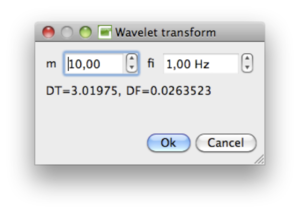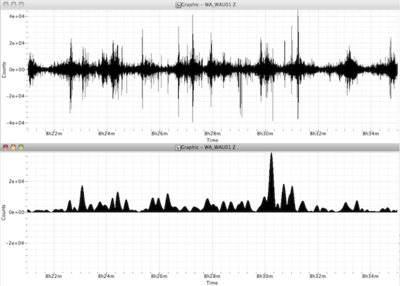Difference between revisions of "Geopsy: Wavelet transform"
| (5 intermediate revisions by 2 users not shown) | |||
| Line 1: | Line 1: | ||
| + | [[Image:Wavelet.png|thumb|right|300px|Wavelet transform parameters.]] | ||
In [[Geopsy]], a [[Wikipedia:Wavelet_series#Wavelet transform|'''Wavelet transform''']] can be either applied at a single frequency using the [[Geopsy: Waveform Menu|Waveform menu]] or on a broad frequency range using the [[Geopsy: Time Frequency Analysis|Time Frequency Analysis toolbox]]. | In [[Geopsy]], a [[Wikipedia:Wavelet_series#Wavelet transform|'''Wavelet transform''']] can be either applied at a single frequency using the [[Geopsy: Waveform Menu|Waveform menu]] or on a broad frequency range using the [[Geopsy: Time Frequency Analysis|Time Frequency Analysis toolbox]]. | ||
| − | When reached through the [[Geopsy: Waveform Menu|Waveform menu]] ''Wavelet transform'' | + | When reached through the [[Geopsy: Waveform Menu|Waveform menu]] ''Wavelet transform'' creates new [[Geopsy: Temporary Signal|temporary signals]] in the active viewer. |
The parameters requested for the Wavelet transform are: | The parameters requested for the Wavelet transform are: | ||
| − | *''m'', the parameter of the wavelet. It | + | *''m'', the parameter of the wavelet. It characterizes the trade-off between time and frequency resolutions. The default value for ''m'' is 10. Increasing m leads to better frequency resolution, but lower time resolution. |
*''fi'' , the wavelet central frequency in Hertz, i.e. the analyzed frequency. This parameter is not used in the [[Geopsy: Time Frequency Analysis|TFA toolbox]]. | *''fi'' , the wavelet central frequency in Hertz, i.e. the analyzed frequency. This parameter is not used in the [[Geopsy: Time Frequency Analysis|TFA toolbox]]. | ||
| + | |||
The wavelet box also displays the time resolution ''DT'' (in seconds) and the frequency resolution ''DF'' (in Hertz) of the Wavelet. In the [[Geopsy: Time Frequency Analysis|TFA toolbox]], providing the analyzed frequency only allows to compute these time and frequency resolutions for various frequency before the computing starts. | The wavelet box also displays the time resolution ''DT'' (in seconds) and the frequency resolution ''DF'' (in Hertz) of the Wavelet. In the [[Geopsy: Time Frequency Analysis|TFA toolbox]], providing the analyzed frequency only allows to compute these time and frequency resolutions for various frequency before the computing starts. | ||
The Wavelet transform multiplies in the frequency domain the signals with a [[Wikipedia:Morlet_wavelet|Modified Morlet wavelet]] of central frequency ''fi'' and parameter ''m'' to the signal: | The Wavelet transform multiplies in the frequency domain the signals with a [[Wikipedia:Morlet_wavelet|Modified Morlet wavelet]] of central frequency ''fi'' and parameter ''m'' to the signal: | ||
| − | <math>M(f)=\frac{1}{\pi^{\frac{1}{4}}}e^{w_0^2(\frac{f}{fi}-1)^2m}</math>, with <math>w_0=6</math>. | + | <math>M(f)=\frac{1}{\pi^{\frac{1}{4}}}e^{-w_0^2(\frac{f}{fi}-1)^2m}</math>, with <math>w_0=6</math>. |
| − | Applying a Wavelet transform at a given frequency ''fi'' allows to analyze | + | |
| + | |||
| + | Applying a Wavelet transform at a given frequency ''fi'' allows to analyze the time distribution of energy of the signal at that particular frequency. | ||
| + | The [[Geopsy: Time Frequency Analysis|TFA toolbox]] applies the Wavelet transform at each frequency to provide a time-frequency plot that distributes the energy of the signal in the time-frequency plane. | ||
See also: | See also: | ||
*[[Wikipedia:Wavelet_series#Wavelet transform|Wavelet Transform (Wikipedia)]] | *[[Wikipedia:Wavelet_series#Wavelet transform|Wavelet Transform (Wikipedia)]] | ||
*[[Wikipedia:Morlet_wavelet|Morlet wavelet (Wikipedia)]] | *[[Wikipedia:Morlet_wavelet|Morlet wavelet (Wikipedia)]] | ||
| + | |||
| + | [[Image:WaveletEx.png|thumb|center|400px|Wavelet transform of parameter m=10 at 1 Hz applied to a sample signal (top: original signal; bottom: Wavelet transform) showing the distribution of energy at 1 Hz in time.]] | ||
Latest revision as of 13:46, 12 March 2010
In Geopsy, a Wavelet transform can be either applied at a single frequency using the Waveform menu or on a broad frequency range using the Time Frequency Analysis toolbox.
When reached through the Waveform menu Wavelet transform creates new temporary signals in the active viewer. The parameters requested for the Wavelet transform are:
- m, the parameter of the wavelet. It characterizes the trade-off between time and frequency resolutions. The default value for m is 10. Increasing m leads to better frequency resolution, but lower time resolution.
- fi , the wavelet central frequency in Hertz, i.e. the analyzed frequency. This parameter is not used in the TFA toolbox.
The wavelet box also displays the time resolution DT (in seconds) and the frequency resolution DF (in Hertz) of the Wavelet. In the TFA toolbox, providing the analyzed frequency only allows to compute these time and frequency resolutions for various frequency before the computing starts.
The Wavelet transform multiplies in the frequency domain the signals with a Modified Morlet wavelet of central frequency fi and parameter m to the signal: , with .
Applying a Wavelet transform at a given frequency fi allows to analyze the time distribution of energy of the signal at that particular frequency.
The TFA toolbox applies the Wavelet transform at each frequency to provide a time-frequency plot that distributes the energy of the signal in the time-frequency plane.
See also:



